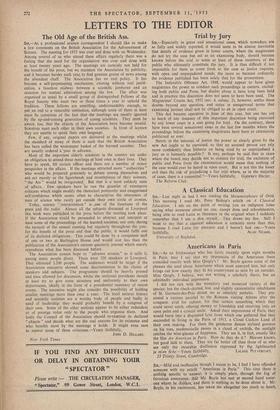Trial by Jury SIR,—Especially in grave and sensational cases, which
nowadays are so fully and widely reported, it would seem to be almost inevitable that details of evidence given in lower courts, where the magistrates do not try the case but act as an examining body, should become known before the trial to some at least of those members of the public who ultimately constitute the jury. It is thus difficult if not impossible for them to come fresh to the case as justice requires, with open and unprejudiced minds, the more so because ordinarily the evidence published has been solely that for the prosecution.
The Indictable Offences Act, 1848, would appear to have given magistrates the power to conduct such proceedings in camera, exclud- ing both public and Press, but doubts about it have long been held and in practice this discretion does not seem to have been used. The Magistrates' Courts Act, 1952 (sec. 4, subsec. 2), however, settles these doubts beyond any question, and states in unequivocal terms that examining justices shall not be obliged to sit in open court.
This Act became operative in June of this year, but one has yet to learn, of any instance of this important discretion being exercised by any lower court in a case going for trial. On the contrary, there have been several sensational cases in the last few months where the proceedings before the examining magistrates have been as extensively publicised as ever.
Surely in the interests of justice the power so clearly given by the new Act ought to be exercised, so that an accused person can rely more confidently than hitherto on being tried by as unprejudiced a jury as is humanly possible-? It may perhaps be said that in cases where the bench may decide not to commit for trial, the exclusion of public and Press from the examination would mean that nothing of the case would ever be heard in open court. But is not this the lesser evil than the risk of prejudicing a fair trial where, as in the majority of cases, there is a committal ?—Yours faithfully, GODFREY HECHT.
The Reform Club.


































 Previous page
Previous page